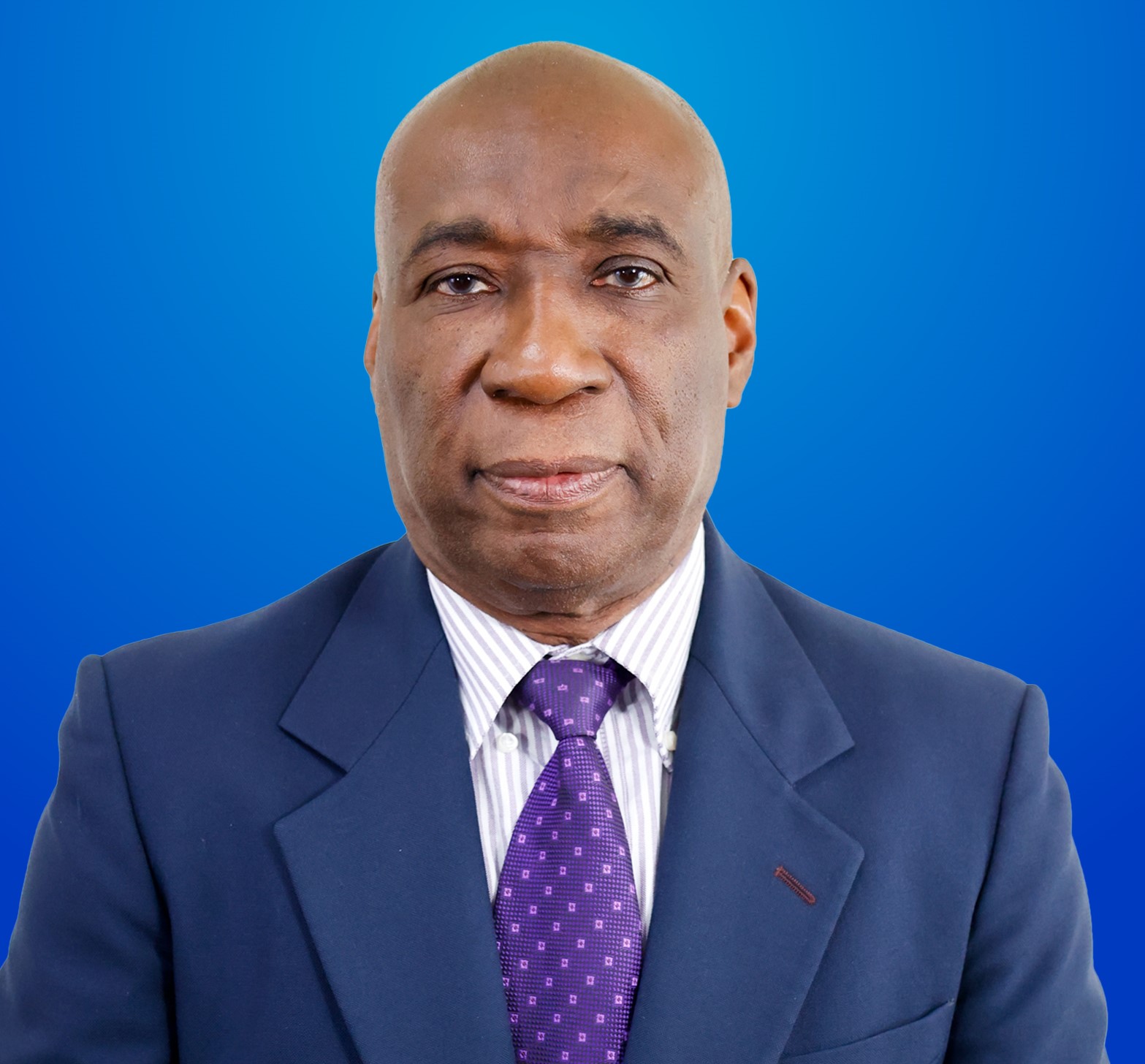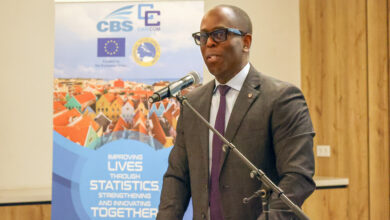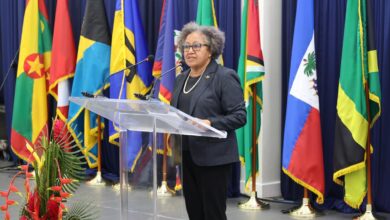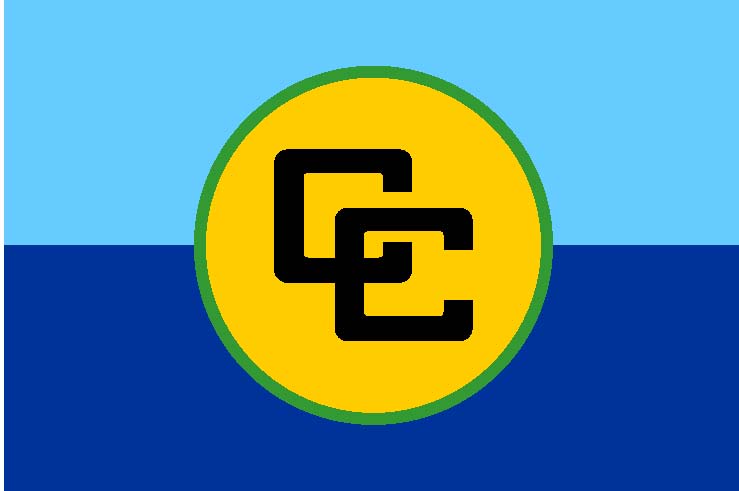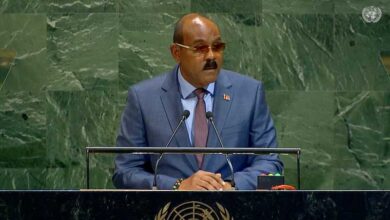CARICOM Assistant Secretary-General, Dr. Wendell Samuel, has called for cooperation to shape a future in which “our environment, including oceans, is not only protected, but fully leveraged for the benefit of our people and future generations.”
Dr. Samuel, who heads the Economic Integration, Innovation and Development Directorate at the CARICOM Secretariat, issued the call at the launch of the CARICOM Environmental and Natural Resources Policy Framework. The policy was launched at the opening of the 118th Special Meeting of the Council for Trade and Economic Development (COTED) on the environment and sustainable development.
“The policy is a culmination of years of regional consultation, technical and political thought leadership on a Caribbean Community that is coordinated, strategic and deliberate in improving its relationship with the environment to support sustainable development and improve the quality of life of the citizens of the Region,” Dr. Samuel said.
Please read his remarks below:
- Honorable Ministers;
- Colleagues;
- Esteemed guests; and
- Citizens of our Caribbean Community
I am addressing this evening’s gathering which is a celebratory recognition of the importance of two Regional Organisations, the launch of an important Regional Public Good, which comes at a time requiring sober reflection. As this Region strives to make significant advances to build resilience and execute a paradigm shift in our development, the world around us is taking a further step backward into instability and uncertainty. Today, we find ourselves in a moment when global and hemispheric shocks are frequent and intense and some influential global institutions have gone silent on these issues. However, this particular grouping is charged with responsibility for our environment and our oceans which are not just a backdrop to our way of life but, are actually a source of sustenance, security, economic opportunity and resilience. For too long, their full value has remained underutilised, while the challenges of pollution, climate change, and biodiversity loss continue to threaten their health and viability.
In this regard, I am heartened to stand before you while as a Region, we make significant advancement in resilience building by taking strategic steps in environmental governance as we launch the CARICOM Environmental and Natural Resources Policy Framework. The policy is a culmination of years of regional consultation, technical and political thought leadership on a Caribbean Community that is coordinated, strategic and deliberate in improving its relationship with the environment to support sustainable development and improve the quality of life of the citizens of the Region.
The vision for the Policy, as agreed by our Member States, is: “A Caribbean Community that values its environmental, natural and cultural resources and applies the principles of good governance to decisions associated with the conservation and sustainable use of these resources in the interest of the peoples of the Region.”
Our Community is geographically unique, facing a distinct set of environmental challenges and opportunities. As our vision statement reflects, the policy framework is comprehensive, encompassing a wide range of thematic areas and policy actions related to land and soils, forests, water, air, and ocean resources to address these challenges and unlock opportunities. Each of these areas is crucial to our Community’s environmental health and sustainability. The policy also strives to place the people of our Region at the heart of all efforts and ambitions to safeguard our natural patrimony.
In this regard, you would note when you view the policy that the names of the technical lead for each Member State is acknowledged in the policy. In order for it to be effective, national ownership was critical during its development and I dare say will be critical in its implementation.
We are also using the launch of the Common Environment and Natural Resources Policy Framework to promote the Region’s efforts to develop one of its important supporting elements and that is the CARICOM Ocean Governance Framework.
When we consider Caribbean development over the decades; economic attention and attraction has started inland with lucrative monoculture and eventually shifted to coastal areas with rapidly growing tourism. Now, eyes are peering into the blue and even beyond the horizon to areas beyond national jurisdiction. We have recognised this shift, and likewise, we are deeply cognisant that there is a substantial blue contribution to the goals of the Revised Treaty of Chaguaramas and the more recent development urgencies of the Community.
Therefore, on the heels of a comprehensive environmental management Policy, we are now building out a policy framework for sustainable ocean governance—one that unites our Member States in a shared vision for responsible ocean stewardship and economic prosperity.
We know that many Caribbean Member States have already developed strategies for ocean-based industries, fisheries management, coastal protection, and maritime security. Yet, we also recognise that without a unified, coordinated regional policy, the potential of our marine resources may never be fully realised. That is why CARICOM has committed to developing a comprehensive policy—one that harmonizes our efforts, strengthens governance, and ensures the protection and sustainable use of our one truly abundant resource.
Our partnerships are key to this effort. Through collaboration with the United Kingdom’s Foreign, Commonwealth and Development Office, we are keen to reinforce ocean governance with international best practices, aligning ourselves with global commitments such as, the Sustainable Development Goals, the Commonwealth Blue Charter, UNCLOS and the Antigua and Barbuda Agenda for SIDS. These partnerships, internal CARICOM partnerships, as well as external partners, some of whom are with us this week, affords us the leverage to apply more tools to unlock new opportunities for trade, innovation, and investment while ensuring that our ocean remains a source of livelihood for generations to come. It would be remiss of me, therefore to not publicly acknowledge the other major contributors to the development of Common Environment and Natural Resources Policy Framework, namely, the Canadian Government, the European Development Fund and the Government of Japan.
In developing the Ocean Policy Framework, the aim is for it to be broad and inter-sectoral, addressing critical priorities such as, pollution reduction, marine ecosystem restoration, and biodiversity conservation. It will strengthen security in our territorial waters, enhance food and nutrition security, and promote investment in “blue” industries—from sustainable fisheries to green shipping, deep-sea mineral resources, and ocean-based renewable energy.
It goes without saying, that these two policies will only be as strong as the commitment behind them. We need the active participation of our governments, private sector stakeholders, research institutions, and coastal communities. We need innovation, investment, and collaboration. Above all, we need political leadership.
I am pleased to recognise the support of the Government of the United Kingdom in the formulation of both policies. I am keen to stress how fundamental and steady a partner the UK has been to the Region as a supporter of sound environmental governance and a voice for SIDS in arenas where we have no voice.
I also want to recognise the OECS Commission as a vital family member in all this. The unwavering support to the Eastern Caribbean Constituents of CARICOM cannot be overstated, particularly in the environment arena with the implementation of the St. Georges Declaration and the Eastern Caribbean Regional Ocean Policy. These are foundational pieces of principled, integrated environmental governance in this region to learn from and build upon.
Therefore, without taking any more time I encourage all CARICOM Member States, our partners, and our citizens to stand with us in these efforts. Let us work together to shape a future in which our environment, including oceans, is not only protected, but fully leveraged for the benefit of our people and future generations.
A thriving Caribbean depends on a thriving environment and a thriving ocean. With the CARICOM Environment and Natural Resources Policy Framework, and the future CARICOM Ocean Governance Framework driven by the people of this Region we believe that we can secure both.
Ladies and Gentlemen, I thank you.

